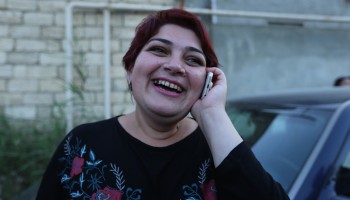Ismayilova, who worked for Radio Free Europe/Radio Liberty’s Azerbaijani service and now for the Organized Crime and Corruption Reporting Project, was instrumental in uncovering massive levels of corruption in Azerbaijan that involved President Ilham Aliyev and his family.
The European Court of Human Rights has ruled that Azerbaijan must pay Ms. Ismayilova €15,000 for non-pecuniary damage and €1,750 for costs and expenses. In its ruling the court took “particular note of reports of persecution of journalists in Azerbaijan as well as the perception that the perpetrators of these acts enjoy impunity”.
Ismayilova was arrested by Azerbaijani authorities in December 2014 and sentenced to 7.5 years in prison in September 2015. After a successful appeal to Azerbaijan's Supreme Court on May 25, 2016 she was released, having spent having spent 537 days in jail. She complained to the European Court of “a systematic smear campaign being conducted against journalists in Azerbaijan for political reasons”.
Having found concealed cameras, a secret telephone line and data used to transmit images filmed by the concealed cameras, in her apartment, Ismayilova requested an investigation into the breach of privacy. This investigation was plagued with deficiencies, with authorities failing to interview key witnesses, as well as significant delays.
In response to her complaints concerning the lack of effectiveness of the investigation, authorities published a progress report on the investigation which disclosed the full names, professions and some addresses of Ismayilova’s family and friends. Ismayilova then initiated civil action against authorities, which was rejected alongside all subsequent appeals.
The European Court has found that in the case of the breach of privacy “the state was not only required to take measures to protect intrusions into her private life, but was also under an obligation under Article 10 of the Convention, to protect its freedom of expression.”
Speaking to OCCRP upon her release in May 2016, Ismayilova described a “revolving door of political prison in Azerbaijan. They release two, they arrest more. They release one, they arrest two” but added that what the government wants is for “journalists, activists, politicians to be afraid of imprisonment and stop criticizing the government”.






